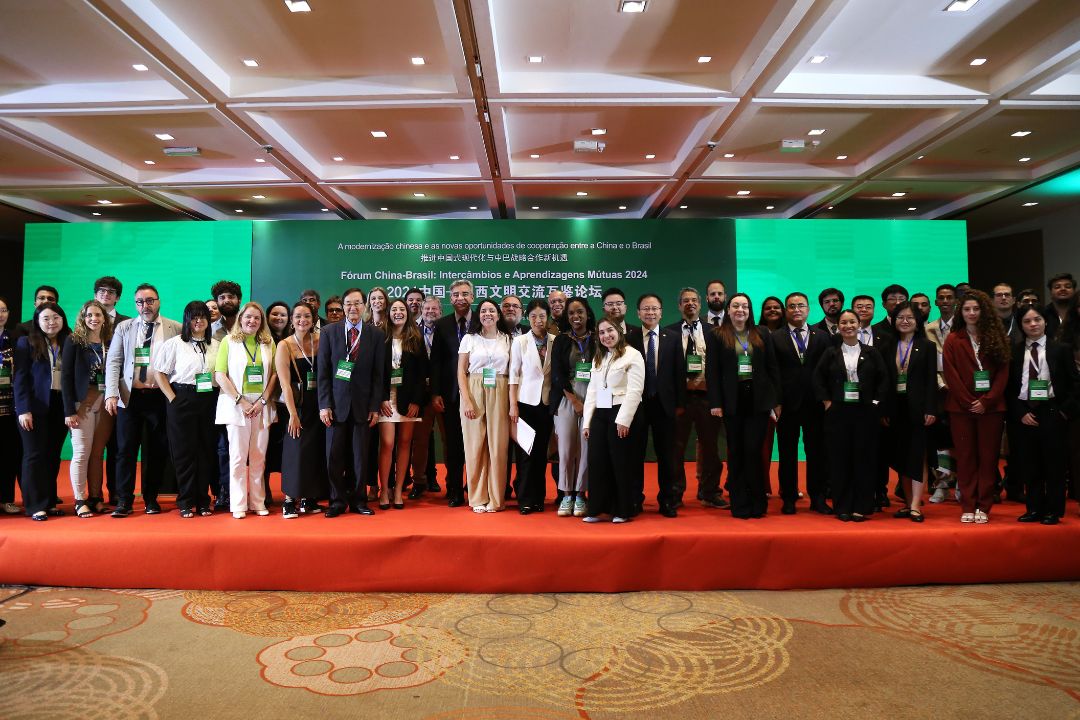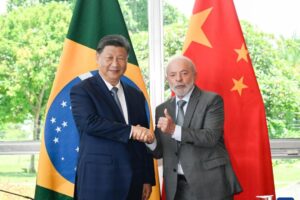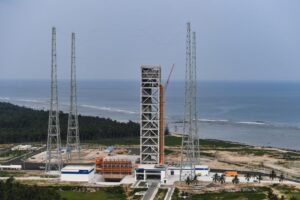
China Today Team
On November 11th, Rio de Janeiro hosted the third edition of the China-Brazil Forum: Exchanges and Mutual Learning. With the theme “Chinese Modernization and New Opportunities for Cooperation between China and Brazil”, the event brought together political, academic and business leaders from both countries to discuss strategies to strengthen the bilateral partnership and explore possibilities for cooperation in areas such as innovation, sustainability and infrastructure. The program included speeches by Chinese and Brazilian authorities, in addition to the launch of cultural products, marking an important step in consolidating dialogue between Brazil and China.
The director of the Americas Center of the China International Communications Group (CICG), Li Yafang, opened the forum, highlighting the importance of exchanging experiences and cultural exchange to strengthen friendship and mutual understanding between the two countries.
Gao Anming, editor-in-chief of CICG, recalled that Chinese modernization offers new opportunities for China and Brazil to build a community with a shared future. China and Brazil must align their strategies, stick to new goals, strengthen traditional areas of cooperation and explore new possibilities to give new impetus to joint development. The world is going through a period of accelerated change and turbulence and transformation, but the general direction of development and human progress, the logic of world history and the trend towards an international community with a shared future remain. The two countries must combine efforts to ensure global peace, stability and development and create an environment favorable to common development.
Starting the Brazilian participation, Ronaldo Carmona, Innovation representative at Finep, highlighted that the forum takes place at a special moment, on the eve of the G20 Summit. For Finep, the alliance between Brazil and China is strengthened in a turbulent geopolitical scenario, creating an opportunity for dialogue between G7 countries and emerging nations. He stressed the importance of global multipolarity, where different centers of power promote sustainable development and peace in the Global South. Carmona also pointed out the historic Sino-Brazilian cooperation in science and technology, especially in the space sector, with the CBERS satellite program, which strengthens the technological autonomy of both nations, and considered that the partnership between Brazil and China must also evolve in terms of cultural, highlighting the need for new projects that celebrate the uniqueness of each country.
Representing the Universidade Federal Fluminense (UFF), Cibele Carneiro addressed the areas of joint action between Brazil and China, such as education, science, technology and sustainable development. According to Carneiro, the bilateral partnership seeks to empower an intercultural generation and foster mutual understanding, valuing cultural individualities. She highlighted three priority fronts for cooperation: education, innovation and sustainability. Carneiro argued that it is through education and sustainable innovation that Brazil and China can contribute to global development, emphasizing the importance of cultural interaction and mutual respect.
“The one who removed the mountain was the one who removed the first stones,” said Carneiro, as a way of encouraging the creation of new concrete plans in Brazil-China cooperation.
Brazil’s ambassador to China, Marcos Bezerra Abbott Galvão, shared his ideas in a speech sent via video, celebrating relations between Brazil and China. “This forum takes place at a unique moment in the Sino-Brazilian relationship. We celebrate 50 years of diplomatic relations between Brazil and China at the highest point of our bilateral relationship”, he said.
Galvão stated that over the last five decades, the two countries have overcome differences and strengthened similarities, building a solid partnership, marked by mutual respect and trust.
The ambassador also celebrated cooperation projects in different areas, including the environment, trade, finance, agriculture, science and technology.
Tian Min, consul general of China in Rio de Janeiro, emphasized that over the past 50 years, China and Brazil have always respected each other, treated each other as equals and committed themselves to mutually beneficial cooperation, thus promoting sustainable, stable and in-depth development of bilateral relations. The two countries have continuously deepened practical cooperation in various areas, achieving fruitful results and benefiting both peoples. At present, China holds high the banner of peace, development and win-win cooperation, unswervingly promoting modernization with Chinese characteristics through high-quality development, while integrating and promoting global development through of an opening to the outside at a high level. China stands ready to work with Brazil on mutually beneficial cooperation of greater scope, high quality and improved structure, helping both countries grow sustainably and providing more benefits to the people of both sides.
Liu Kean, vice president of CRRC shared that since entering the Brazilian market in 2003, CRRC has overcome challenges and gained respect. Both parties created value and shared results, achieving a win-win situation. CRRC adopts a “five-location model”, which includes local production, local procurement, local employment, local service and local management, and actively assumes the roles of “cultural interpreter”, “industrial promoter”, “talent incubator” and “good neighbor”. By playing these four roles, CRRC has contributed to local economic development and improved population well-being. CRRC will continue to work with all Chinese and Brazilian parties to strengthen Sino-Brazilian cooperation in multiple sectors, build bridges between people and open a new chapter of relations between China and Brazil in this new era.
Afterwards, the forum gave space to special speeches by guests Chai Yu, general director of the Institute of Latin American Studies of the Chinese Academy of Social Sciences, and Evandro Menezes de Carvalho, Executive Editor of China Hoje magazine.
Chai Yu highlighted the importance of the partnership between China and Brazil for strengthening the Global South. She highlighted that both countries share “their own ideas for the future”, with solid principles and a common motivation to seek greater prosperity, security and happiness, which strengthens collaboration between them.
Chai Yu also emphasized Brazil’s strategic role, especially in the agricultural and energy sectors, as pillars of Sino-Brazilian cooperation. She noted that, as one of Brazil’s largest markets, China has been instrumental in driving Brazilian economic growth. The director defended an expansion of cooperation, promoting “economic complexity” and the development of more sophisticated products with greater added value, consolidating the partnership between the two countries in the context of the Global South.
In turn, Evandro Menezes de Carvalho praised the commitment of the CICG and its director, Li Yafang, in organizing the forum. Carvalho shared his own journey of exchange with Chinese culture, recalling conversations and experiences that illustrate the similarities between Brazil and China and the importance of popular wisdom.
The professor cited the book “China, the Northeast that went well”, which reports on author Heloneida Studart’s trip to the Asian country in the 1960s. Comparing it with Brazilian development in the same period, Carvalho highlighted: “The difference is that China developed in less than 40 years, without needing to invade or explore other countries. China has proven that it is possible to achieve the dream of modernization.”
He also highlighted Chinese success in eradicating poverty, ten years ahead of the target set by the UN, reinforcing that the Chinese experience can inspire Brazil to pursue an autonomous and sustainable development model.
Following, Evandro Menezes de Carvalho, was moderator in a conversation about how Chinese modernization can inspire and contribute to Brazil’s development in strategic areas.
Li Bangyong, president of CRRC Brasil, introduced the company’s initiatives to adapt its products to the reality of Brazil, ensuring a diverse and sustainable path.
Rio de Janeiro state deputy Dani Monteiro highlighted the importance of building a less fragmented world and promoting human development in an inclusive manner. Claudia Jannuzzi, advisor to the Economic Development Secretariat of the State of Rio de Janeiro, celebrated the territorial similarities between Brazil and China, noting how these two great nations now have the opportunity to strengthen a strategic partnership that contributes to food security, energy and poverty eradication. Then, the vice-president of Invest Rio, Júlio Cesar Azevedo, highlighted Rio de Janeiro’s role as host of major global events and the government’s work to ensure post-pandemic economic recovery.
Representing culture, Ricardo Piquet, general director of the Museum of Tomorrow, shared his personal experiences on previous visits to China, highlighting the urban transformation he witnessed in cities such as Beijing and Shenzhen. He praised China’s commitment to sustainability and long-term planning, which have made possible projects such as the environmental revitalization of urban areas and the promotion of a green economy.
Finally, as representatives of the Brazilian media, Fabiana Ceyhan, editor-in-chief of Brasília in Foco and Renato Rovai, director of Revista Fórum, emphasized the importance of Brazil-China relations and called for more opportunities for cooperation in the future.
The forum concluded with the launch of a special edition of China Hoje magazine, presented by Alfredo Nastari, and the documentary “A História da Sinergia”, promoted by Li Yafang. These cultural products are part of the ongoing commitment to promoting mutual understanding and strengthening Sino-Brazilian ties.
The 3rd China-Brazil Forum was consolidated as an important milestone in the construction of a solid and strategic partnership, bringing together efforts so that cooperation between the two countries advances and brings real benefits to their populations. In a scenario of global challenges, China and Brazil position themselves as leaders in building a more fair, sustainable and multipolar future.
Source: https://www.chinahoje.net/3a-edicao-do-forum-china-brasil-intercambios-e-aprendizagens-mutuas-destaca-modernizacao-chinesa-e-novas-perspectivas-para-a-cooperacao-sino-brasileira/

